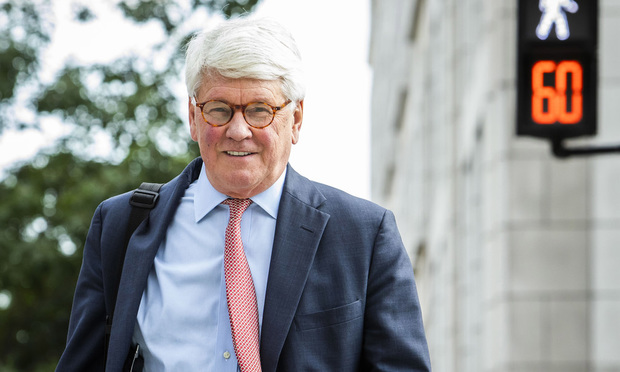Why Greg Craig's Trial Was a 'Misguided and Unnecessary' Prosecution
The decision to indict Gregory Craig was not an evenhanded exercise of prosecutorial discretion. It was rather an exercise of prosecutorial power in furtherance of another goal.
November 12, 2019 at 10:57 AM
5 minute read
 Former Obama White House Counsel Gregory Craig leaves federal court in Washington, D.C., on Aug. 22, 2019. Photo: Diego M. Radzinschi/ALM
Former Obama White House Counsel Gregory Craig leaves federal court in Washington, D.C., on Aug. 22, 2019. Photo: Diego M. Radzinschi/ALM
I was privileged to be one of the lawyers who defended Gregory Craig in his recent trial and acquittal. He was entirely innocent, as the jury quickly decided. In most cases, lawyers in my position would thank the jury for doing the right thing and move on. But this misguided and unnecessary prosecution deserves more scrutiny than it has received. It raises profound concerns about the judgment and motivation of officials at the U.S. Department of Justice who insisted that Craig be indicted.
The decision to indict in this case was not an evenhanded exercise of prosecutorial discretion. It was rather an exercise of prosecutorial power in furtherance of another goal.
The notion that grand juries are safeguards against meritless prosecutions is unmitigated fiction. The only real protection against baseless indictments of innocent people is prosecutorial discretion, one of the holy grails of the adversary system. When that discretion is clouded by priorities unrelated to the merits of a case, it can and often does produce the kind of profound injustice that was done to Craig and his family.
In March 2018, the National Security Division (NSD) of the Department of Justice referred the Craig matter, among others, to U.S. Attorney Geoffrey Berman of the Southern District of New York for a decision on whether to prosecute.
My colleagues and I met with the U.S. attorney and his principal deputies for more than three hours in September 2018, and presented orally and in writing the reasons why Craig was innocent and why a prosecution was not only unjustified but would fail. We were assured that the office took our concerns seriously, and the U.S. attorney personally asked if Craig would toll the statute of limitations so that his office could give the matter careful attention before deciding whether to prosecute. We heard nothing more from the Southern District of New York, although CNN reliably reported that that office informed the NSD that it declined to prosecute our client.
One week before the tolling agreement was to expire, we were contacted by the NSD and told it had taken the case back from the Southern District, and that it would now be jointly run by the NSD and the U.S. Attorney's Office for the District of Columbia. Our meetings in D.C. with the recently confirmed Assistant Attorney General for National Security John Demers and the U.S. attorney and her staff were courteous, but there was no question that the driver was now the NSD.
In March of this year, Demers requested that he be permitted to address a conference of white-collar criminal defense lawyers sponsored by the American Bar Association in New Orleans, according the chair of that conference, Ray Banoun.
Demers took that opportunity to declare a shift "from treating [the Foreign Agents Registration Act] as an administrative obligation and regulatory obligation to one that is increasingly an enforcement priority," as was reported in The New York Times in March. And he specifically referred to the ongoing Craig investigation. No one in attendance misunderstood the message. There was a new sheriff in town, and Craig was going to be the poster child for a new FARA enforcement regime. The indictment came soon after.
The indictment did not charge Craig with violating FARA's registration requirement, but with a cobbled-together theory of false statements and omissions, including some allegedly made at a meeting between Craig, other Skadden, Arps, Slate, Meagher & Flom attorneys and the FARA Unit in October 2013. It was remarkable that there were no notes taken by the FARA Unit during that meeting, and basically no record of what had been discussed.
There is no real explanation for prosecuting a case that a highly respected U.S. Attorney's Office had either declined or politely discouraged, and that lacked proof, except that going after Craig in particular was integral to a statement that NSD wanted to make. It was my view then and now that the decision-makers either had no interest in the evidence or no experience in evaluating how a real case would be presented and proved at trial.
Indicting Craig was massively unfair and unjust. The worst kind of prosecutorial discretion was at play—the kind that puts making a policy statement ahead of common sense and justice. No "enforcement priority"—even a righteous one—justifies plowing ahead on a defective case, consequences for the accused be damned. The Justice Department should apologize to Craig and his family for bringing this case.
Equally important, prosecutors at the Justice Department and elsewhere must take a hard look at the enormous power they wield on a daily basis for good and ill. They should be reminded of what Attorney General Robert H. Jackson once warned a conference of U.S. attorneys: "The most dangerous power of the prosecutor [is] that he will pick people that he thinks he should get, rather than pick cases that need to be prosecuted."
William W. Taylor III is a founding partner of Zuckerman Spaeder and a veteran litigator. He represented Gregory Craig at his recent trial.
This content has been archived. It is available through our partners, LexisNexis® and Bloomberg Law.
To view this content, please continue to their sites.
Not a Lexis Subscriber?
Subscribe Now
Not a Bloomberg Law Subscriber?
Subscribe Now
NOT FOR REPRINT
© 2025 ALM Global, LLC, All Rights Reserved. Request academic re-use from www.copyright.com. All other uses, submit a request to [email protected]. For more information visit Asset & Logo Licensing.
You Might Like
View All
Skadden and Steptoe, Defending Amex GBT, Blasts Biden DOJ's Antitrust Lawsuit Over Merger Proposal
4 minute read
'Lack of Independence' or 'Tethered to the Law'? Witnesses Speak on Bondi
4 minute read
Trending Stories
- 1'A Death Sentence for TikTok'?: Litigators and Experts Weigh Impact of Potential Ban on Creators and Data Privacy
- 2Bribery Case Against Former Lt. Gov. Brian Benjamin Is Dropped
- 3‘Extremely Disturbing’: AI Firms Face Class Action by ‘Taskers’ Exposed to Traumatic Content
- 4State Appeals Court Revives BraunHagey Lawsuit Alleging $4.2M Unlawful Wire to China
- 5Invoking Trump, AG Bonta Reminds Lawyers of Duties to Noncitizens in Plea Dealing
Who Got The Work
J. Brugh Lower of Gibbons has entered an appearance for industrial equipment supplier Devco Corporation in a pending trademark infringement lawsuit. The suit, accusing the defendant of selling knock-off Graco products, was filed Dec. 18 in New Jersey District Court by Rivkin Radler on behalf of Graco Inc. and Graco Minnesota. The case, assigned to U.S. District Judge Zahid N. Quraishi, is 3:24-cv-11294, Graco Inc. et al v. Devco Corporation.
Who Got The Work
Rebecca Maller-Stein and Kent A. Yalowitz of Arnold & Porter Kaye Scholer have entered their appearances for Hanaco Venture Capital and its executives, Lior Prosor and David Frankel, in a pending securities lawsuit. The action, filed on Dec. 24 in New York Southern District Court by Zell, Aron & Co. on behalf of Goldeneye Advisors, accuses the defendants of negligently and fraudulently managing the plaintiff's $1 million investment. The case, assigned to U.S. District Judge Vernon S. Broderick, is 1:24-cv-09918, Goldeneye Advisors, LLC v. Hanaco Venture Capital, Ltd. et al.
Who Got The Work
Attorneys from A&O Shearman has stepped in as defense counsel for Toronto-Dominion Bank and other defendants in a pending securities class action. The suit, filed Dec. 11 in New York Southern District Court by Bleichmar Fonti & Auld, accuses the defendants of concealing the bank's 'pervasive' deficiencies in regards to its compliance with the Bank Secrecy Act and the quality of its anti-money laundering controls. The case, assigned to U.S. District Judge Arun Subramanian, is 1:24-cv-09445, Gonzalez v. The Toronto-Dominion Bank et al.
Who Got The Work
Crown Castle International, a Pennsylvania company providing shared communications infrastructure, has turned to Luke D. Wolf of Gordon Rees Scully Mansukhani to fend off a pending breach-of-contract lawsuit. The court action, filed Nov. 25 in Michigan Eastern District Court by Hooper Hathaway PC on behalf of The Town Residences LLC, accuses Crown Castle of failing to transfer approximately $30,000 in utility payments from T-Mobile in breach of a roof-top lease and assignment agreement. The case, assigned to U.S. District Judge Susan K. Declercq, is 2:24-cv-13131, The Town Residences LLC v. T-Mobile US, Inc. et al.
Who Got The Work
Wilfred P. Coronato and Daniel M. Schwartz of McCarter & English have stepped in as defense counsel to Electrolux Home Products Inc. in a pending product liability lawsuit. The court action, filed Nov. 26 in New York Eastern District Court by Poulos Lopiccolo PC and Nagel Rice LLP on behalf of David Stern, alleges that the defendant's refrigerators’ drawers and shelving repeatedly break and fall apart within months after purchase. The case, assigned to U.S. District Judge Joan M. Azrack, is 2:24-cv-08204, Stern v. Electrolux Home Products, Inc.
Featured Firms
Law Offices of Gary Martin Hays & Associates, P.C.
(470) 294-1674
Law Offices of Mark E. Salomone
(857) 444-6468
Smith & Hassler
(713) 739-1250











